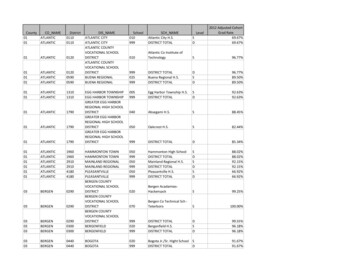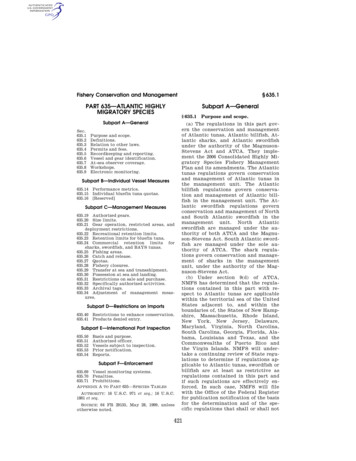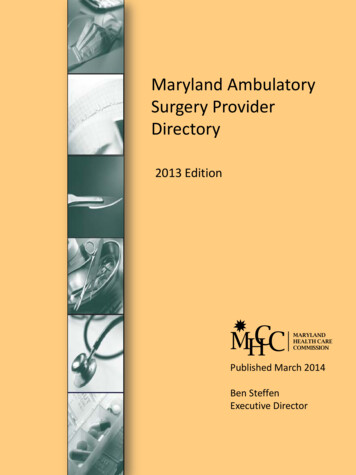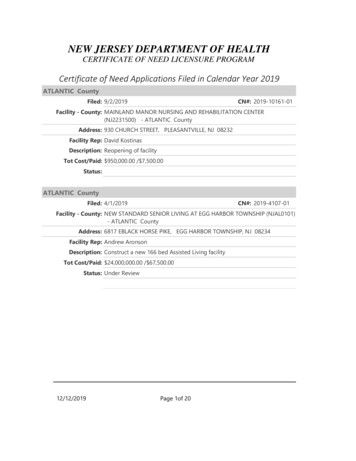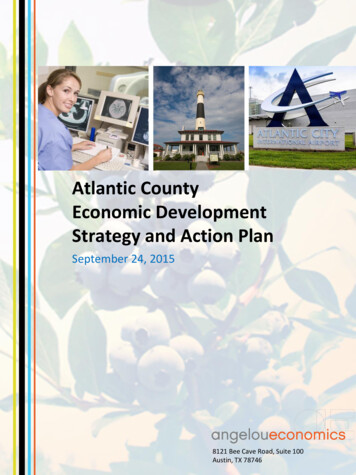
Transcription
Atlantic CountyEconomic DevelopmentStrategy and Action PlanSeptember 24, 20158121 Bee Cave Road, Suite 100Austin, TX 78746
Table of ContentsAcknowledgements . . 3Executive Summary . 6Market Assessment . 17Target Industries . 31Strategies and Goals . 51Redevelopment Sites . 101Public Policy . 104Conferences . 106Implementation . . 109About AE . 112Atlantic County 2
AcknowledgementsNo economic development strategic plan can be created and implemented without the input andsupport of key community stakeholders. We owe great thanks to the business leaders, residents andmany public and private organizations throughout Atlantic County, who generously shared their timeto make this strategic planning process comprehensive, relevant and ultimately effective.We thank in particular the visionary members of the project steering committee and Atlantic Countystaff that devoted countless hours reviewing findings, listening to presentations and providing inputand navigation. In their wisdom and guidance lies bright hope for a greater quality of life and aprosperous economic future for all residents and businesses in Atlantic County.Our Thanks To:Atlantic Cape May Workforce Investment BoardAtlantic Cape Community CollegeAtlantic City Metropolitan Business and Citizens AssociationAtlantic County Economic Development Advisory CommitteeAtlantic County Institute of TechnologyAtlantic County Dept. Of Regional Planning and DevelopmentAtlantic County Mayors AssociationAtlantic County Public School DistrictsAtlantic County Utilities AuthorityAtlantiCareCasino Reinvestment Development AuthorityGreater Atlantic City ChamberGrow New JerseyHammonton Chamber of CommerceLevenson Institute of Gaming, Hospitality and TourismMunicipal Economic Development CommitteesNew Jersey Business Action CenterNew Jersey Community CapitalNew Jersey Dept. of Labor and Work Force DevelopmentNew Jersey Economic Development AuthorityPascal Sykes FoundationRutgers UniversityRutgers New Jersey Agricultural Extension ServiceNew Jersey Small Business Development CenterSouth Jersey Economic Development DistrictSouth Jersey Transportation AuthorityMunicipal, State and Federal Elected OfficialsStockton UniversityWorkforce New Jersey – Atlantic/Cape MayAtlantic County 3
AcknowledgementsAtlantic County ExecutiveDennis LevinsonJerry DelRosso, County AdministratorHoward Kyle, Chief of StaffAtlantic County Board of Chosen Freeholders:Frank D. Formica, ChairmanJames A. Bertino, Vice ChairmanColin G. BellJohn L. CarmanErnest D. CourseyRichard R. DaseAlexander C. MarinoWill PaulsJohn W. RisleyThe Atlantic County Improvement AuthorityBoard of Commissioners:Roy M. Foster, ChairmanRobert J. Tarby, Sr., Vice ChairmanMayor John ArmstrongEdwin G. Blake, SecretaryRobert P. GrossMayor Don GuardianReverend Milton HendricksJoseph IngemiNeil McPeak, TreasurerAtlantic County 4
AcknowledgementsAtlantic County “Action Now” Steering Committee:Leo Schoffer, Schoffer Enterprises – Committee ChairmanJohn Armstrong, Mayor of AbseconRich Baehrle, Berkshire Hathaway/Fox & Roach RealtyFrank Blee, AtlantiCareMike Bray, SPED / Passion VinesBilly Chang, Atlantic China Tourism InvestmentClinton M. Cochran, KravcoRick Dovey, Atlantic County Utilities AuthorityFrank Frankowski, South Jersey Transportation AuthorityJanet Garraty, Go Jane NewsCharles Garrett, South Jersey Transportation AuthorityMark Giannantonio, Resorts CasinoLinda Gilmore, Atlantic County GovernmentDavid Goddard, Ole Hansen & SonsMitchell Gurwicz, Max Gurwicz EnterprisesJoseph Ingemi, IBMJoe Kelly, Greater Atlantic City ChamberHoward J. Kyle, Atlantic County Chief-of-StaffPhyllis Lacca, Masterpiece AdvertisingJohn C. Lamey, Jr., Atlantic County Improvement AuthorityLance B. Landgraf, Jr., Casino Reinvestment Development AssociationKen LeFevre, Pathfinder Resources, LLCMatthew Levinson, Casino Control CommissionCarlo Losco, Balsley Losco RealtyRhonda Lowery, Work Force Investment BoardAlex Marino, Stockton UniversitySteve Mazur, South Jersey Transportation AuthorityDr. Peter Mora, Atlantic Cape Community CollegePaul Perillo, FEMAWill Pauls, So. Jersey Building & Construction Trades CouncilRichard Perniciaro, Atlantic Cape Community CollegeJohn Peterson, Atlantic County Planning DepartmentDr. Israel Posner, Lloyd D. Levenson Institute (Retired)Jon Powell, CEO, KravcoJim Rutala, Rutala AssociatesSharon Schulman, Stockton UniversityJoseph Sheairs, Stockton Aviation Research Technology ParkGreg Sykora, SPED / Erco BlindsMax Slusher, Atlantic County Improvement AuthorityFred Snyder, FAA William J. Hughes Technical CenterElizabeth Terenik, City of Atlantic City, Planning & DevelopmentMitch Zitomer, Fox and Roach RealtorsAtlantic County 5
Executive SummaryExecutive SummaryIt would be difficult to overstate the precarious condition of the Atlantic County economy, and theacute need for community leaders to implement short- and long-term economic developmentstrategies to reduce the region’s overdependence on the tourism and gaming sector and diversifyits economic base. Much of Atlantic County’s difficulty stems from two issues: the lack of anysignificant industry cluster activity other than tourism and gaming, and the lack of a regionaleconomic development organization to brand and market the area and aggressively recruit newcompanies. To address these and other issues, Atlantic County must adopt a regional approach toeconomic development.In many ways, Atlantic County’s difficulties are not unique. Regions across the U.S. have faceddevastating economic blows with the closing of a military base, the relocation of a major factoryor other game-changing events. Many of those communities have successfully forged ahead innew and more promising economic directions.Communities that have overcome serious economic setbacks have succeeded by realizing thattheir challenges were too large and complex to be solved by any single governmental entity ororganization. Rather than wait for rescue from the state or federal government, theseAtlantic County 6
Executive Summarycommunities identified their problems and developed and implemented their own plan forrecovery marshalled by business and residential leaders. Atlantic County recognizes that it mustdo the same, and that is why this economic development strategic plan was initiated.The challenges that confront Atlantic County are not all economic. There is a need to abandon oldways of community thinking. There is a need to move away from dubious practices of the past,such as banking a future on only one industry. The region must aggressively develop othersuitable industry clusters. The extent of the dominance of gaming tourism in Atlantic County tothe detriment of all other clusters is uncommon, and should be regarded as a serious long-termthreat to future economic prosperity.The antecedents of Atlantic County’s current economic turmoil are rooted in the early success oflegalized casino gambling. The easy prosperity that initially accompanied that industrydiscouraged business and community leaders from seeking greater economic diversification.Casino gambling strongly impacted the composition of the workforce and the development ofworkforce skills in Atlantic County. For a good portion of the past 39 years, casinos have offeredlow-skilled workers jobs that paid good wages and benefits. This in turn attracted more suchworkers to the area. When the Atlantic City casino industry contracted, the region found itselfwith a disproportionate number of freshly unemployed low-skilled workers. Many technicallyoriented businesses are reluctant to locate in Atlantic County because they are uncertain therequired workforce skill sets will be available. Skilled workers must be attracted to the area andthe skill level of resident workers must be improved. Education and workforce developmentefforts are critical.Atlantic County has also been encumbered by an antiquated tradition of “home rule” thatencourages municipalities to focus their energies too parochially, thereby missing out on moresubstantive economic opportunities that can only be realized through regional cooperation. Ashared vision of what Atlantic County can become must be created and the realm of economicdevelopment must be declared a “no politics zone.”AngelouEconomics recommends the creation of an adequately funded, private sector driven,regional economic development corporation to rebrand Atlantic County and to aggressivelymarket and recruit new companies. Without such an economic development corporation,Atlantic County will not be able to compete effectively against more progressive regions. The lackof a vibrant and effective EDC may cause many industries to perceive the region to be unfocusedand inexperienced at economic development, and businesses will seek more accommodatinglocations. In fact, without the efforts of a regional EDC, many domestic and internationalbusinesses will remain unaware of Atlantic County as a potential location site.As a first step, AE recommends that a board of directors be created with the expertise to planfor the creation, staffing and funding of an Atlantic County Economic DevelopmentCorporation. The ACEDC will implement the new Atlantic County Economic DevelopmentStrategy and Action Plan and act to ensure continuing economic prosperity in the future.Atlantic County 7
Executive SummaryThe new EDC will be responsible for implementing a marketing plan that includes strategies andactions for target industries. Experienced staff will organize committees and planning groups toaddress issues identified in the Atlantic County Economic Development Strategy and Action Plan.Appointed committees will also leverage talent within the county to review existing federal andstate incentives to determine additional avenues of funding and support and to recommend stateand local policy changes that can assist Atlantic County in achieving its economic developmentgoals.Despite its challenges, Atlantic County is poised with opportunities and significant economicdevelopment assets, such as the FAA William J. Hughes Technical Center, the Atlantic CityInternational Airport, Richard Stockton University, Atlantic Cape Community College, beautifulbeaches, agriculture, and first class hospitals and medical facilities. Business and communityleadership must come together with passionate commitment and determination to build on theseand other assets and to overcome the region’s challenges. That cohesive commitment will beessential in dealing with Atlantic County’s declining economic opportunities and dramatic socialconcerns. If the private sector understands the significant scope of the region’s economic issuesand steps up to the plate to take strategic and effective action, then a brighter and moreprosperous future is obtainable. The choice belongs to local businesses and residents, and thefuture of Atlantic County is in their hands.Atlantic County and ACIA initiated this strategic planning project to help diversify and advance theeconomy, increase the asset and revenue base of the county, improve employment rates andgrow higher paying jobs. Development of strategy has been accomplished in four phases:Phase I: StakeholderEngagementPhase II: MarketAssessmentPhase III: TargetIndustry AnalysisPhase IV: StrategicRecommendationsAtlantic County 8
Executive SummaryStakeholder Engagement:The strategies in this plan were many months in development. The project began withstakeholder engagement, conducted through on-site interviews and focus groups, and throughonline surveys of local businesses and residents. More than 300 stakeholders provided importantinput through direct interviews, focus groups and community forums. More than 1,100stakeholders additionally participated through online resident and business surveys. Informationgathered during the stakeholder phase was combined with the analysis of statistical data frompublic and private sources, and run through evaluation models developed by Angelou Economics.In total, 995 residents responded to the Atlantic County survey. Residents perceive the mostserious challenges facing the region to be: high cost of living, general economic health, high taxes,casino closings, lack of available jobs and a lack of strong community leadership.An additional 111 businesses responded to the Atlantic County survey. Business surveyrespondents ranked access to customers, operating costs, and quality of life as the mostimportant factors influencing their business. The largest gap between importance and level ofquality existed for tax climate, operating costs, and regulatory environment.Market Assessment:In order to gain a better understanding of the social,economic, and demographic issues relating toAtlantic County, a market assessment wascompleted in phase two of the project. To gaugeAtlantic County’s performance in a variety ofmetrics, Atlantic County was benchmarked againstDubuque County, Erie County, Roanoke City, andWashoe County. Data metrics for Atlantic Countywere also compared to New Jersey and the U.S.Benchmarks were selected by the Atlantic CountyImprovement Authority (ACIA) based on theirsimilarity to Atlantic County in income levels,population, industry makeup, and higher educationlevels.The market assessment evaluated Atlantic County’spopulation and education demographics, workforcedemographics, and economic highlights. A retail gapanalysis was performed to analyze Atlantic City’s andAtlantic County’s retail mix. A total surplus of 742million is being spent within the county. People fromSelected Benchmarks:Dubuque County, IowaErie County,PennsylvaniaRoanoke City,VirginiaWashoe County,Nevadaoutside the region are coming to Atlantic County to shop in clothing stores, grocery stores andfull service restaurants. Minor retail leakage occurs from residents shopping outside the areafor electronic shopping and mail order houses, electronics and appliance stores and generalmerchandise stores.Finally, the market assessment determined the region’s leverageable assets and challenges toovercome.Atlantic County 9
Executive SummaryThe identified leverageable assets and challenges play a crucial role in the decision makingprocesses in the next phases of the report. Leverageable assets provide Atlantic County with keyadvantages, if utilized properly, which can be vital in helping the region attract targeted industries.Challenges to overcome, on the other hand, act as barriers to the process and must be addressedthrough planning and modifications.Leverageable Assets (Not ranked by order of importance) Airport and airspace opportunities Federal Aviation Administration (FAA) and UAV testing sites Other Federal programs and facilities Stockton University Atlantic Cape Community College Stockton Aviation Research and Technology Park Proximity to major markets (30 million Consumers) ACDEVCO Environmental amenities Quaint communities with tourist appeal Development, redevelopment, and repurposing opportunities Affordable home prices Global connectivity Casino Reinvestment Development AuthorityChallenges to Overcome(Not ranked by order of importance) Lack of economic diversity Lack of regional economic development coordination/cooperation State-centric economic development reliance Economic decline High taxes Other high costs of doing business High unemployment Low workforce skills Deteriorating Atlantic City infrastructure Areas of high crime Varied K-12 school performance State regulatory impediments, including CAFRA and PinelandsAtlantic County 10
Executive SummaryTarget Industries:The Target Industry Analysis focused on key industriesAtlantic County should work first to attract. The analysisincluded an evaluation of employment levels,establishments, wages, growth levels, and locationquotients for all North American Industry ClassificationSystem (NAICS) codes in Atlantic County.Virtually no clustering exists outside of the Travel and FoodServices sector. Therefore, national growth trends, regionalassets and the goals of the Atlantic County communityweighed heavily in the selection of target industries.Target industries are: Aerospace and Aviation, Life Sciences,Tourism, Specialty Manufacturing, and EntrepreneurialBusiness Services as industries to target.Aerospace and AviationLife SciencesTourismSpecialty ManufacturingEntrepreneurial BusinessServicesIn order to more narrowly focus target industry marketing, AE identified target industry niches foreach of the chosen industries. These niches were also chosen for their fit to the community andfor their economic potential to create bridges across industries and opportunities fordiversification. To foster a deeper understanding of the target industries and define the economicdevelopment activities necessary, these niches were grouped into three categories; mature targetniches, diversification target niches, or emerging target niches.Economic development efforts for mature niches, such as aeronautics testing grounds and callcenters, should focus on retention and expansion activities. Diversification niches, such as aircraftmaintenance operations and festivals, should have economic development efforts focused onattraction and entrepreneurship activities. And finally, emerging niches such as climate changeresearch centers need economic development efforts focused on expansion, attraction, andentrepreneurship activities. Vast potential exists for added development of specialtymanufacturing, especially in niches tied to aeronautics, tourism and life sciences industries.An Occupational Analysis was performed to gain an understanding of what occupations arerequired by these target industries to support their business activities. The analysis also identifieshigher-paying career paths within each industry. Any gaps in local workforce skill can then beidentified. Often the occupational analysis helps to identify the specific needs for workforceeducation strategies.Emerging Life Sciences Eco Niche: Studies conducted by Princeton Universityand the U.S. Environmental Protection Agency, have identified the Mid-Atlantic regionand Coastal New Jersey in particular to be a critical area of impact for coming sea levelrise. Global architecture firm Perkins Will has issued a detailed proposal and isspearheading an effort to establish Atlantic City as an international research hub forclimate change and coastal resiliency, repurposing vacant casinos as housing forscientists and lab centers for universities. Burgeoning political support and Princetoninterest are giving the idea viability.Atlantic County 11
Executive SummaryCost of Operations AnalysisTo better understand where economic development incentives need to be applied or boosted, AEperformed an analysis of the cost of doing business for three specific niche businesses within thetarget industries. The cost analysis was performed for each benchmark city and presented as acost index across primary functional areas of business. The benefit of such analysis helps topinpoint what economic incentives will have the greatest positive impact on attracting a specificindustry by shoring up areas that are not cost competitive. The analysis also helps determine howAtlantic County should approach marketing based on cost advantages.A cost of operations analysis was conducted for the Aerospace and Avionics AircraftMaintenance niche. Atlantic County, in particular, the Atlantic City Airport shows significantpromise as a location for such a maintenance and repair operation. There is land space available,although taxiway infrastructure would have to be constructed. Atlantic County shows competitivecost factors for employee payroll, building costs/lease payments and property tax. AtlanticCounty’s estimated annual cost of operations was mid-range at 32.9 million, compared to a highin Queens County of 42.3 million and a low in Philadelphia County at 29.7 million. The adjacentlocation of the Federal Aviation Administration research center could also be a competitive factor.A cost of operations was conducted for the Entrepreneurial Business Services Call Center niche,showing Atlantic County to be at a competitive disadvantage to its benchmark locations. AtlanticCounty had the highest cost of operations at 6.6 million/year, compared to lowest benchmarkDubuque County with a an annual estimated cost of 5.5 million. Local payroll costs were thehighest factor comparatively. Experience has shown that the region can overcome the costdisadvantage through incentive offerings. In the summer of 2015, ACIA was able to attract theNETCAST BPO call center by offering 32 million in tax credits and workforce training subsidies.Cost of operations analysis for the Specialty Manufacturing industry Food Processing nicheshowed that Atlantic County lacks competitive advantage in attracting those plants. AtlanticCounty had the highest annual estimated cost of operations at 3.8 million, compared to lowestcost benchmark Houston County with 2.4 million. Once again, payroll and utilities costs drovelocal operating expenses higher.Eagle Aviation Maintenance and Repair OperationAtlantic County 12
Executive SummaryStrategic Action Plan:In this final project phase, AngelouEconomics provides the Atlantic County ImprovementAuthority a strategic action plan of recommendations for the ACEDC to implement to help attracttarget industries, utilize their assets to the best of their abilities, and improve upon theirweaknesses. The recommendations are developed with insights gathered from the first threephases of the project. Public policy initiatives are suggested to supplement or improve existingincentive packages.Recommendations are organized into four overarching goals, and then further detailed throughsuggested strategies and actions.Overarching Strategic GoalsEmpowerRegionalEconomicDevelopmentDrive roductRethinkDestinationAttraction1) Empower Regional Economic Development ActivityEconomic development in New Jersey has mostly been performed at the state level. The resultinglack of local direction has kept Atlantic County from receiving the attention it needs to remainsuccessful. Business and community leaders must issue forth a vigorous economic developmenteffort if they are to stem the county’s declining tax base and bolster the economy. The first step inthis direction is the creation of a board of directors to establish a regional economicdevelopment corporation. AE has provided strategies, as well as best practices, for establishinggovernance and anti-poaching agreements, determining organizational structure and staffingneeds, and establishing an appropriate budget for the corporation.2) Drive Industry DiversificationOn top of marketing the region, the Atlantic County Economic Development Corporation’s prioritylies in creating industry diversification. The current lackluster economic climate in the region haslargely resulted from little variation in the industries that support the economy. The ACEDC mustattract new industries, help retain and expand current industries, and foster innovation.The ACEDC should set up target industry task forces that help recruit industries to the region.Task forces should include key stakeholders within that industry or industry supply chain.Furthermore, the economic development corporation should be up to date on current trends andchanging events within those industries. ACEDC staff and task force leaders should join industryand economic development organizations and attend industry-related conferences.Atlantic County 13
Executive SummaryIn order for the ACEDC to foster a robust retainment and expansion program, the corporationmust first understand the needs of local businesses. This understanding can be gained throughsurveys and visits to area businesses. The ACEDC should also sponsor local small business eventsand present awards to outstanding businesses within Atlantic County - the success of localbusinesses is the success of the region as a whole.Finally, the economic development corporation should work to foster a strong entrepreneurialecosystem. Stockton University, Atlantic Cape Community College and local Chambers ofCommerce are well-positioned to aid the ACEDC in increasing entrepreneurial activity. In order tospark innovation and creativity, the economic development corporation should investigateestablishing an incubator, accelerator, and coworking space. To encourage greater levels ofinnovation and entrepreneurism, ACEDC should also help create an affordable makers space toprovide access to workshop areas and cutting edge manufacturing tools, including 3D printers andlaser cutters. By creating opportunities to share the cost of such equipment and space, the barrierto entry is greatly reduced for entrepreneurs working to produce prototypes.The ACEDC should also work with private partnerships and utilize state and federal funding tohelp provide capital for local start-ups.3) Improve the Economic Development Product:The perception of Atlantic County will play a large role in its ability to attract businesses andresidents. Advancing the economic development product is therefore a key component of theaction plan. Four strategies have been developed to accomplish this upgrade: Improve Workforce Bring Infrastructure up to Standard Consolidate Municipal Services Integrate Municipal Master Plans Develop a Customer Service CultureMass layoffs following the 2014 collapse of four casinos has left thousands unemployed. AtlanticCounty has had trouble attracting companies to the region due to a lack of skilled workers. TheACEDC will need to form strong lines of communication between businesses and skills traininginstitutions to better educate the existing workforce to fit the needs of the local businesscommunity as well as targeted industries. Online education should be a component of this effort.A number of difficult infrastructure issues exist within Atlantic County. Many municipal roads needto be repaved and some town centers need a face lift to be more appealing to visitors. This isespecially true in Atlantic City. The ACEDC should look into state incentives for downtown mainstreet redevelopment. Live work spaces, mixed-use zoning, and public Wi-Fi are important tools inbringing more life into town centers. Finally, options should be explored to expand Internetconnectivity to fiber optics in the near future.Atlantic County 14
Executive SummaryOne of the most important actions the ACEDC and business and community leaders can take tochange the future of Atlantic County for the better is to revise the master plans of municipalitiesto include an identification and evaluation procedure for prime county properties and restrictthe development or redevelopment of those properties to best use purposes in accordance withthe overarching regional Atlantic County Economic Development Strategy and Action Plan.Integral properties should be developed with a specific long-term plan in mind to optimizestrategic economic development. As the area sees growth in innovation and becomes home tonew industries, it is important that a regional plan for districts and employment centers guidesthe collaborative efforts of all cities. Five prime properties within the county have been identifiedfor suggested best use practices and incorporated into the regional strategic plan.Atlantic County Strategic Real Estate LocationsPropertyLocationSizeOwnerProject UseEstimated CostPossible FundingBader FieldAtlantic City142 AcresAtlantic CityPhase 1: SportsComplex, Phase II:World Trade Center 100 Million Sales tax sharing,EB5 Visa, DivertedCRDA FundsStockton AviationResearch and TechParkFAA William J.Hughes TechnicalCenter Campus55 AcresStockton UniversitySpec Building toInclude Incubator 15 MillionPublic/PrivatePartnershipAtlantic CityInternationalAirportEgg HarborTownshipPortion of 84 AcresFAA/SJTAAircraftMaintenance,Repair andOverhaul FacilityPossible sales tax 5 Million Buildingrebate, TIFF, EB5 8-9 MillionVisa, Public/Private,TaxiwaysDiverted CRDAHamiltonRacetrackHamiltonTownship250 AcresParks CasinoEnclosed ThemeParkCovered by OwnerRoute 40 CombinedPurpose ProjectsBuena VistaTownship7 Acres 4 Sisters4 Sisters - Plant192 Acres RichlandBuena VistaVillageTownship HistoricSpecialty Mfg. and 1.6 Million forDestinationCombined ProjectsDevelopmentEDA Grants,Tourism Grants,Historic Society,CRDA, TaxAbatementAtlantic County’s longstanding efforts to encourage municipalities to regionalize services such asanimal control, police and fire training and central dispatch services are laudable and shouldcontinue. An aggressive plan should be formalized and implemented to help cities mergeservices in order to reduce the tax burden on existing county residents. Particular attentionshould be given to determining options for reducing the number of public school districts.The business community and the economy of Atlantic County are heavily dependent on theservices sector. An established destination location, tourists, casino gamers and summer homeowners come to the area expecting a high level of service delivered by employees who areexcited to be a part of the picture. Over the years, the area has lost its direction in developingquality service ethics. Atlantic City is developing an entrenched reputation for poor service andpoor delivery attitude. The ACEDC should immediately implement a service quality councilfocused on improving the region’s customer service culture in order to improve the image of theregion and protect its claim to tourism and other service-expectant sectors.Atlantic County 15
Dubuque County, Erie County, Roanoke City, and Washoe County. Data metrics for Atlantic County were also compared to New Jersey and the U.S. Benchmarks were selected by the Atlantic County Improvement Authority (ACIA) based on their similarity to Atlantic County in income levels, population, industry makeup, and higher education levels.
